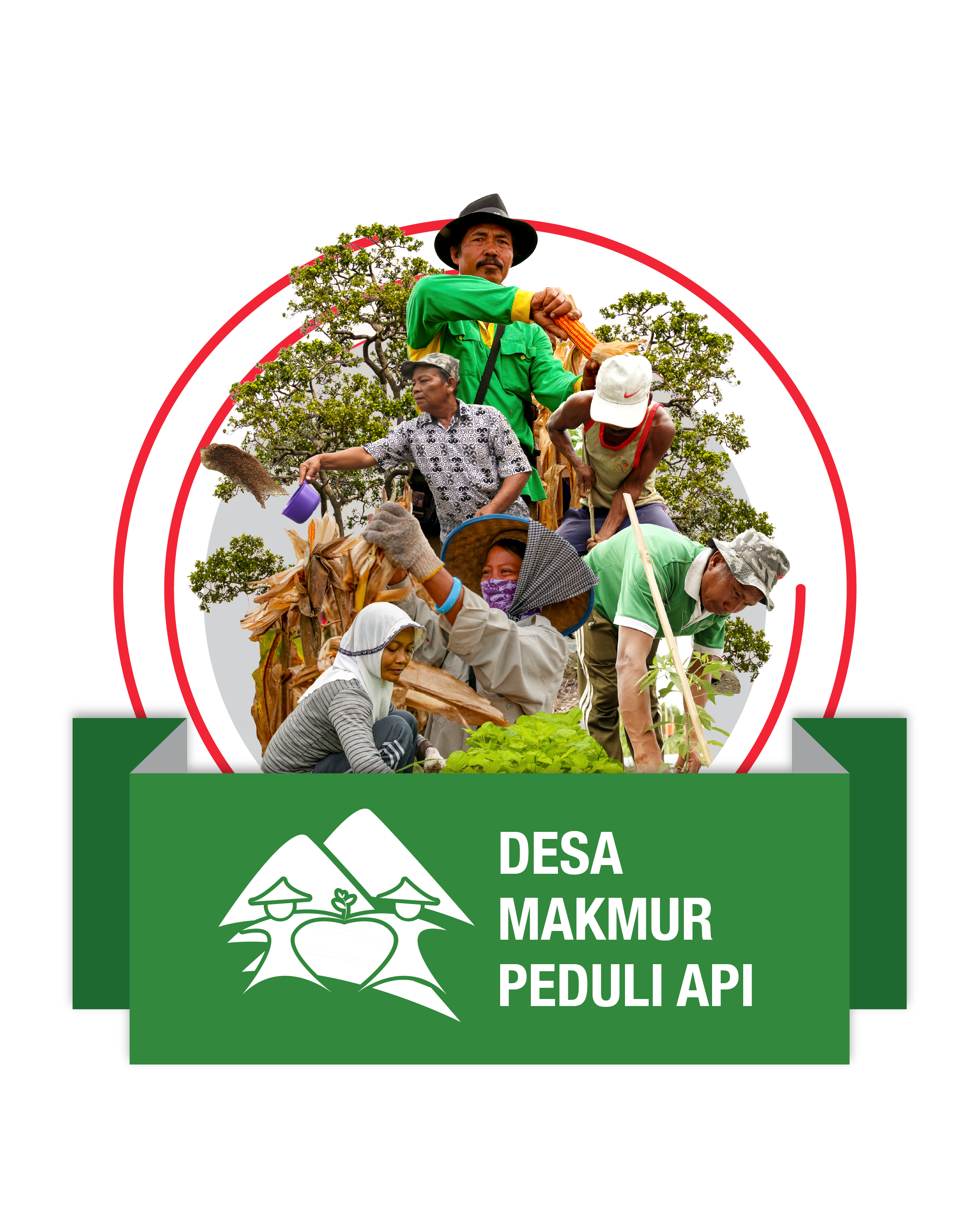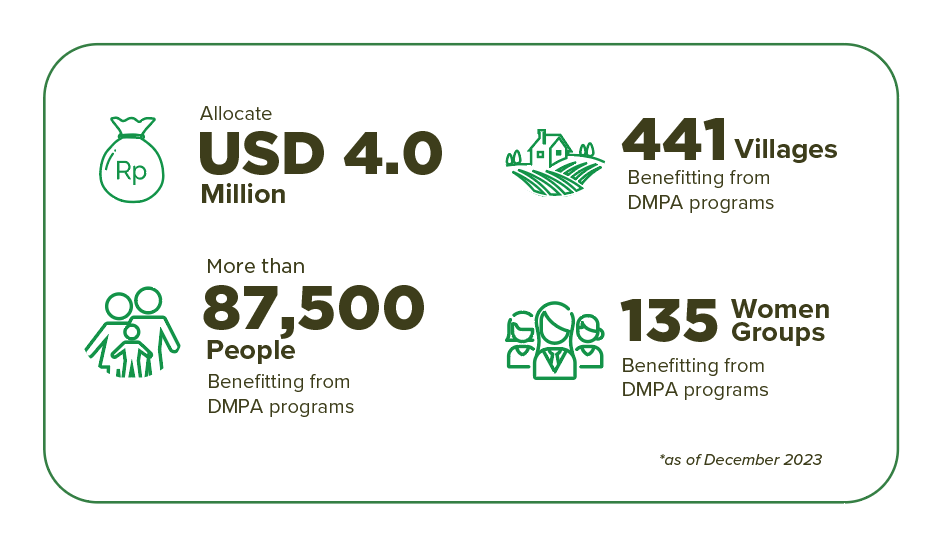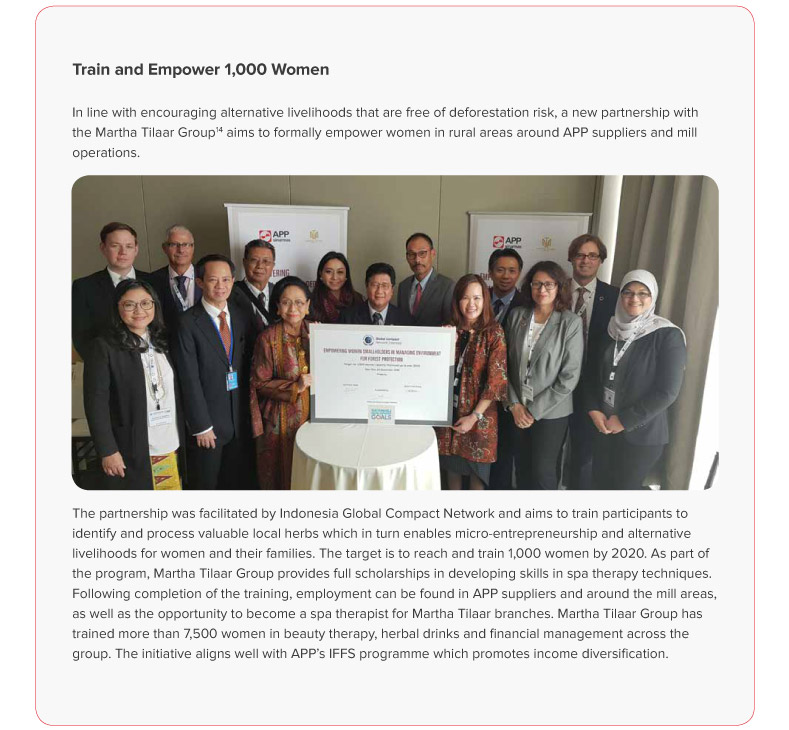
Sustainability
PeopleBy empowering local communities through a range of programs, we provide the mechanism to decouple economic growth from deforestation. And ensuring every employee, contractor and visitor to our sites returns home safe is our number one priority.
Desa Makmur Peduli Api (DMPA)

Communities play an important role in forest conservation. In many places around the world, people are living not only nearby but also inside forests. It is therefore important to engage with them to work together to protect the environment.
APP launched Desa Makmur Peduli Api (DMPA) program, based on the integrated forestry and farming system concept, in 2015 as a means to tackle the issue of forest and land fires. The program aims to lessen the pressure on forest land by providing alternative livelihoods for the communities living in and around forest areas. The program takes a participatory approach, encourages ownership of the community as well as improves the capacity of the village-owned institution to ensure the sustainability of the program.
As of 2023, the DMPA program has been implemented in 441 villages with a budget of USD3.7 million, benefitting more than 87,500 people and partnering with 223 BumDes, 9 corporations, and 189 farming groups. The program is targeting an additional 30 villages in 2023. The approach taken is participatory and encourages ownership of the community and village-owned institutions to ensure program sustainability.
Since 2018, there have been 135 women’s groups actively involved in the women’s empowerment program. The program’s key objective is to reduce the risk of fire, and fire prevention content is emphasized throughout the program, with a focus on environmentally-friendly land preparation and maximizing available land outside the forest area. In 2022, at least 90% of the villages monitored by APP’s fire monitoring program were free of fire.

Some of DMPA program in 2022:
- Kelompok Wanita Tani (KWT) Mekar Tani, a women's farming group in Maredan village, Tualang, has ventured into the production of instant red ginger powder under the brand name "MEKAR" with the help of PT. Arara Abadi. This new business was developed after three members attended a herbal plant utilization training sponsored by our DMPA program and Martha Tilaar Group in May 2019. Mekar currently employs 8 people and contributes to KWT's income, enabling the group to expand its business activities. The group produces 30-80 kg of high quality red ginger powder from 20-40 kg of fresh ginger per month, packaged in two sizes (250 g and 80 g), and distributes them within Tualang and other cities in Riau province. With a strong commitment to product quality and customer satisfaction, KWT Mekar Tani aims to become the leading producer of red ginger powder in Siak district and Riau province.
- Through the DMPA program, PT. FI is committed to empowering communities in Sanggau District. Desa Mengkiang is one of the program's villages, and women have traditionally worked in the weaving industry using pandan and rattan. However, their products have been limited to agricultural caps sold primarily in the village area. PT. FI supports the UMKM weaving business "Muncang Lestari" by Bu Mamy, who received weaving training from APP and Vinto Craft in 2019. While other Desa Mengkiang participants have continued to weave, Bu Mamy has consistently developed a variety of weaving products and expanded her network beyond the village level.
In addition to assisting the weaving industry in Desa Mengkiang, PT. FI has also assisted honey farmers in Bahta Village, Sanggau District, near the concession area. Through DMPA, PT. FI has provided honey farming facilities and equipment such as honey extractors, beehives, labels, post-harvest equipment. Since 2019-2020, 50 honey farmers in Sanggau, Tabau, Ronai, and Kutub Villages have been empowered and trained on beekeeping practices, in order to improve the quality and quantity of their honey production. These farmers work tirelessly to ensure the production and harvesting of high-quality honey for the market. With the assistance of PT. FI, these communities are able to grow their businesses and contribute to the local economy.
- The village of Sumber Agung is an agrarian community with coffee farming as one of their main commodities. However, the productivity of coffee farmers has declined over time, and many have shifted to more profitable crops like palm oil. To empower coffee farmers, PT. Daya Tani Kalbar has implemented the DMPA program since August 2018, providing 5,000 coffee seedlings, production support, and technical assistance on a 5-hectare demo plot. The program aims to improve the capacity and livelihoods of coffee farmers in Sumber Agung.
- The Mekar Jaya farmer’s group was established in 2016 with the facilitation of Universitas Jambi and Bank BNI. The collaboration between PT. WKS and Mekar Jaya was initiated due to the high demand for compost. Initially, 300 tons of compost were supplied to PT. WKS from October to December 2016. From 2016 to 2018, the group focused on increasing compost production and synergizing with BUMDes Dataran Kempas. They also developed themselves by learning the process of making compost granules, resulting in an average monthly revenue of 300 tons. However, from 2019 onwards, their revenue increased to Rp.5.4 billion annually, and they expanded their business by transmitting the knowledge of composting to eight other groups in different villages. The group also developed their composting process by creating a new organic fertilizer brand called "Mikroba Super Ajaib," which was more cost-effective and efficient. The success of the Mekar Jaya was driven by the support of the DMPA program, which facilitated their collaboration with PT. WKS and provided them with the necessary knowledge and resources to expand their business. The program also encouraged them to share their knowledge with other groups, creating a ripple effect that supported the development of other local businesses.
- The Bank Sampah Mandiri (BSM) group in Suka Maju Village, Tenggarong Seberang District, is empowered to manage plastic waste by producing Paving Blocks with the help of PT Sumalindo Hutani Jaya. The BSM has 8 members and 254 customers, almost all of whom are women. The raw materials are sourced from surrounding companies, including the community, schools, health centers, and nearby firms, at a purchase price of Rp. 300/kg for packaging plastic and Rp. 800/kg for plastic bottles. The BSM produces an average of 1,180 kg/month of plastic waste, which is used to create 590 pcs of Paving Blocks. The selling price for the Paving Blocks is Rp. 10,000/pcs, and the labor cost is Rp. 2,000/pcs. The group markets the Paving Blocks to government offices and the local community.
The group receives support for workshop development through the DMPA program, fish farming program, training funds, and distribution of plastic raw materials from companies. The customers' savings range from Rp. 300,000 to Rp.500,000/year, which are usually given in the form of basic necessities. The BSM's income from producing Paving Blocks is Rp. 22,000,000. The group won first place in the Technology Appropriate Competition (TTG) at the provincial level in East Kalimantan on 27 June 2022, and participated in the national TTG event in Cirebon on 18 October 2022.
APP is committed to continuing our support for the local communities. Moving forward, we are focusing on opening more access to the market for the DMPA products, and diversifying the micro, small and medium businesses under the DMPA program.
Community Business Model Development in Partnership with ICRAF-CIFOR-YKAN
APP engages three organisations, World Agroforestry (ICRAF), Center for International Forestry Research (CIFOR) and Yayasan Konservasi Alam Nusantara (YKAN , the main partner of The Nature Conservancy Indonesia) to develop a guideline to develop a business model for the community. This project originates from the desire to replicate the Desa Makmur Peduli Api (DMPA) programme in other villages outside APP’s suppliers’ concession areas to support the government in local economic development while at the same time ensuring environmental protection. In developing the guidelines, each organisation uses their own approach to community empowerment.
CIFOR conducted their assessment in two villages in Riau, while ICRAF in two villages in South Sumatra and YKAN in two villages in West Kalimantan. In 2020, the CIFOR and ICRAF completed the business model development, as well as the monitoring and evaluation and the guideline on how to develop the business model itself.
Empowering Community, Empowering Women
In our effort to improve lives, we have focused on community empowerment programs that deliver long-term and sustainable livelihood improvements. Our responses to on-ground needs are guided by a Social Impact Assessment (SIA) for each case, and if relevant and feasible, the creation of a targeted five-year CSR plan.
The CSR program priorities are divided into four pillars: Charity, Infrastructure, Capacity Building, and Community Empowerment. These are in line with the Government of Indonesia's development priorities, such as social forestry, where the Government allocates forest areas for management by community groups in an attempt to remove pressure on natural forests.
At the mill level, we review each proposal put forward by the community before funding it. At the same time, each mill has an annual working plan program adjusted to their respective needs, developed in consultation with local communities and other beneficiaries.
Our community investment programs are key to our commitment to addressing the United Nations’ SDGs, especially goal number 1 (no poverty), number 2 (zero-hunger), number 3 (good health and well being), number 5 (gender equality), number 6 (clean water and sanitation), number 8 (decent work and economic growth), and number 12 (responsible consumption and production). One such program focusing on women empowerment, in collaboration with Martha Tilaar Group and supported by Indonesia Global Compact Network, aims to train 1,000 women from communities in and around our concessions and mill operations.

We also have collaboration with Doktor Sjahrir Foundation (DSF) to educate the communities, especially housewives, on economic empowerment. Nowadays due to the COVID-19 pandemic, women have bigger roles than before by helping with the family welfare, supporting the family income. Our collaboration with DSF includes activities as follow:
- In collaboration with DSF and Vinto Craft, APP invites women in and around its concessions to improve their lives by offering alternative livelihoods through the Kalimantan Rattan Project. The project is part of the Desa Makmur Peduli Api (DMPA) program that focuses on empowering women, through training in rattan weaving skills. Due to the pandemic, the training was conducted virtually. Vinto Craft provides training on product finishing techniques and product marketing to complement the previous weaving skills training. This program has been running since 2019 in two villages, Mengkiang Village and Miau Baru Village in Kalimantan. Until now, there have been 600 crafts from these two villages .
- Since 2020, APP and YDS conduct e-commerce workshop which teaches participants basic knowledge of online marketplace, and provides them with basic techniques such as photography and copywriting which will help them to boost the sales of their products. In 2021, the workshop invites resource person/trainers from women entrepreneur community, which provide education on product innovation and developing business model.
Our other major CSR programs is on providing access to clean water and proper sanitation, which promotes community health and environment. In several locations, this project also include community-based waste management program, where not only the villages now have proper waste disposal and management system, but also recycling facilities to help address waste issue.
Free, Prior and Informed Consent
Our Forest Conservation Policy commits to Free, Prior and Informed Consent (FPIC) of indigenous and local communities on any proposed development or forest management activities in existing plantation areas. It also commits us to resolve conflict effectively and handle complaints responsibly.
Forests are at risk of clearance when ownership or tenure is contested. With economic pressures, the need to alleviate poverty often becomes the root cause of environmentally unsustainable practices. Complex historical and customary rights could also be a factor in these practices. Over recent years we have employed an array of measures to drive the resolution of land disputes. These include:
• Mapping the land dispute.
• Creating and implementing working plans to address each land dispute.
• Accelerating land dispute resolution as part of Key Performance Indicators (KPIs).
• Establishing a Social and Security Division to handle land dispute resolution.
• Developing standard operating procedures (SOP) for land dispute resolution.
• Establishing Regional Social Working Group (SWGR) in Riau, Jambi and South Sumatra.
By the end of 2021, 61% of land disputes were resolved, reflecting steady growth in conflict resolution. Around 25% of these conflicts were related to villages inside concession areas.
We have come to realize that trust takes time to build but can be lost in a moment, and that village politics can be complex, with involvement from external parties often bringing new, potentially conflicting, interests. This can also be exacerbated by the fact that staff at the district level may struggle to manage conflict resolution. Nevertheless, we strive to do our best in managing all disputes and conflicts as part of our commitment to sustainable and responsible operations.
In line with this commitment, we continue to resolve land conflicts to the best of our abilities while gaining insight and knowledge from every new interaction. Below are summaries of our mediation processes and the lessons learned from each of them :
- Senyerang Village with PT. Wirakarya Sakti
- Village Community Riding with PT Bumi Mekar Hijau
- Datuk Rajo Melayu with PT PSI
- Sekato Jaya community with PT. Wirakarya Sakti (updated in February 2025)
- Most recently in December 2022, APP facilitated the resolution of a dispute between the communities of Simpang Bayat village in South Sumatra and one of our suppliers, PT. Bumi Persada Permai (BPP). This dispute resolution is part of the “Joint Boundary Mapping & Land Utilization of Old Villages Around Concessions” initiative in collaboration with Econusantara and involves the active participation of the community. The disagreement involved claims over 258 hectares of land and had been ongoing since 2018. The mediation process respected community rights and involved stakeholders in accordance with APP's commitment protocol known as the Forest Conservation Policy (FCP). The parties issued a press release to mark the end of the dispute, which you can read here.
Workers Welfare
Meeting our employees’ needs and attracting new talents are vital for the long term sustainability of our business. We provide attractive benefits and working conditions with long-term career prospects. Some of the benefits that we provide include paid annual leave, both maternal and paternal parental leave, sabbatical leave, health insurance, and a company pension plan. On top of that, additional benefits are also provided for permanent employees, but these vary according to local regulations under which each mill operates.
Our Employee Welfare Policy drives our action, detailing our commitment to meet the requirement of ILO Standards on employee safety, well-being, human rights, labor rights, skills, and data protection.
We strive to position APP as a dynamic company with strong employment benefits that extend beyond salary, health insurance, pension, the ability to earn an additional bonus through various recognition schemes we have in place, and annual career development reviews that our permanent employees receive.
These policies have had a positive effect. With a loyal and long-serving workforce, the turnover within management staff is low in some areas of our organization. We have also stepped up our work to ensure that young talent is recognized and that these employees can envision a prosperous future at APP.